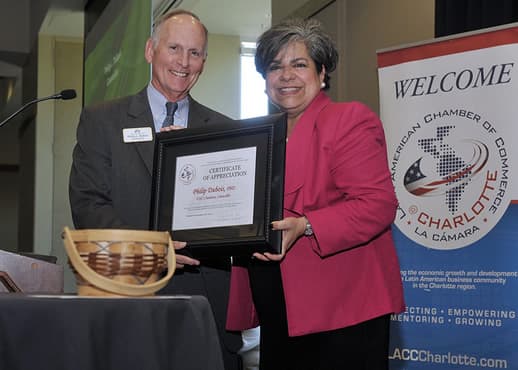Dubois tells Latin American Chamber of University growth, programs and services

Higher education is critical to the growth of urban areas, such as Charlotte, and how the University has instituted a number of programs and services to support the region’s growing Hispanic population were key points Chancellor Philip L. Dubois stressed as UNC Charlotte hosted an on-campus meeting of the Latin American Chamber of Commerce Wednesday, Oct. 15.
“Our 2,000 Hispanic students make up about 7.3 percent of the University’s student population,” noted Dubois. “Over the past five years, we have seen our population grow 93 percent. Not only are we attracting solid Latino students, we are doing a better job than most schools to ensure they get their degrees.”
The chancellor cited a report by the Center for American Progress that named UNC Charlotte as one of three universities nationally with an outstanding record of programs/services aimed at helping first-generation and minority students to achieve the goal of a college degree.
University initiatives that support Hispanic student success include the Office of Latino Student Services, established in 2013; eight student organizations that serve the Latino and Hispanic campus population, including one fraternity and two sororities; and professional organizations in engineering and finance/accounting.
“One of our student organizations, the Hispanic College Awareness Program, organizes more than 50 sessions a year for elementary, middle and high school students and parents to begin the conversation about how to negotiate the admissions process and to develop interest among those students to attend college, especially UNC Charlotte,” Dubois stated.
Beyond supporting its Hispanic population, the University is committed to creating awareness of Latino heritage among members of the UNC Charlotte community. The recent International Festival featured ethnic food and cultural activities from more than 50 countries, including Mexico, Peru, El Salvador and Ecuador.
Through the Office of International Programs, UNC Charlotte undergraduate and graduate students participate in study abroad programs with Latin American colleges in Argentina, Brazil, Chile, Costa Rica, Cuba, Ecuador, Mexico and Peru.
Also, the University offers undergraduate and graduate degrees in Latin American studies. The master’s program is the only one of its kind in the Southeast. Students who pursue this degree can earn concurrently a Master of Business Administration.
Dubois explained that while UNC Charlotte excels in its mission, the University faces a number of challenges that business leaders, such as the members of Charlotte’s Latin American Chamber of Commerce, can address.
“Two-thirds of our students require financial aid, and we have the largest number of needy students of any campus in the UNC system. As a result, the vast majority of our students work while trying to attend school full time,” said Dubois. “Business people like you can help by sponsoring paid internships that will help a student get career experience while earning funds they need to attend college.”
He added that decreased state support, no capital funding and tuition caps have reduced the University’s budget, and the risks put UNC Charlotte at the crossroads of affordability and accessibility.
“The economic success of a region depends upon college attainment,” explained the chancellor. “For each year of education an individual completes after high school, there is a 17 percent increase in earnings.”
Nearly 200 members of Charlotte’s Latin American Chamber of Commerce attended the meeting to hear the chancellor’s keynote address. The U.S. Hispanic Chamber of Commerce named the Charlotte group its 2014 Chamber of the Year among medium-sized associations.